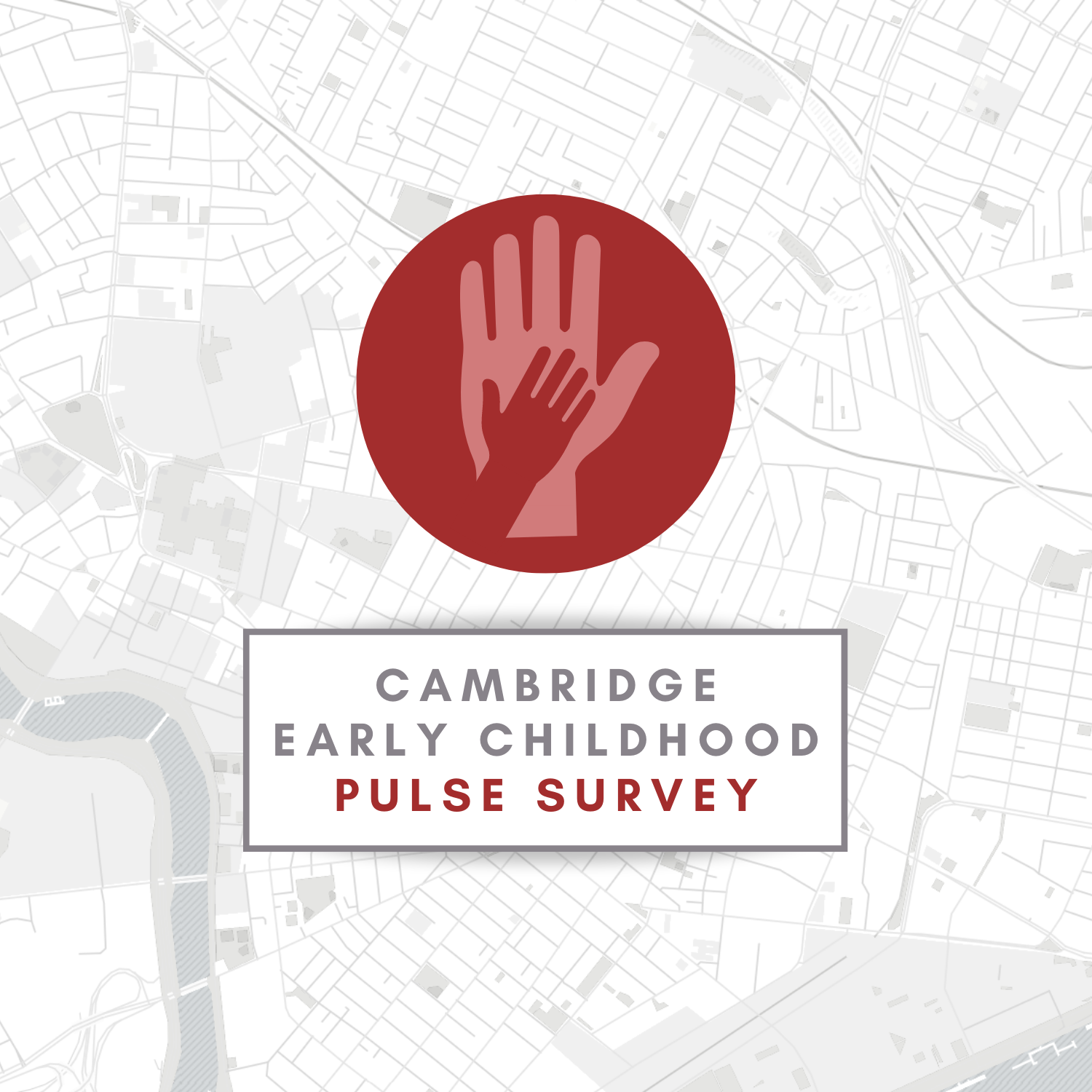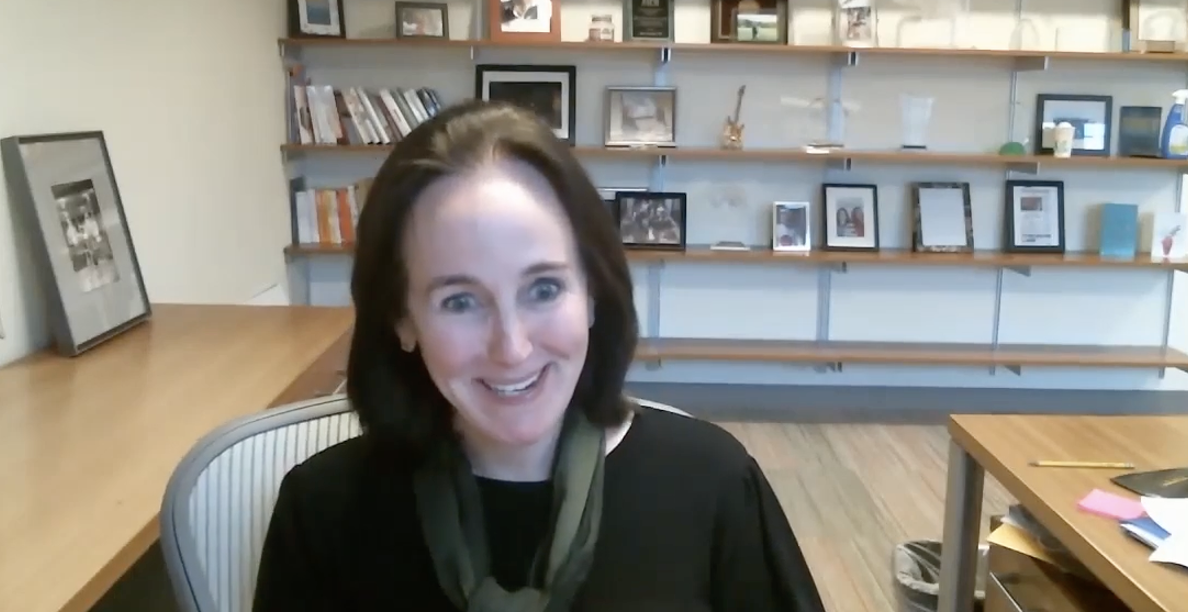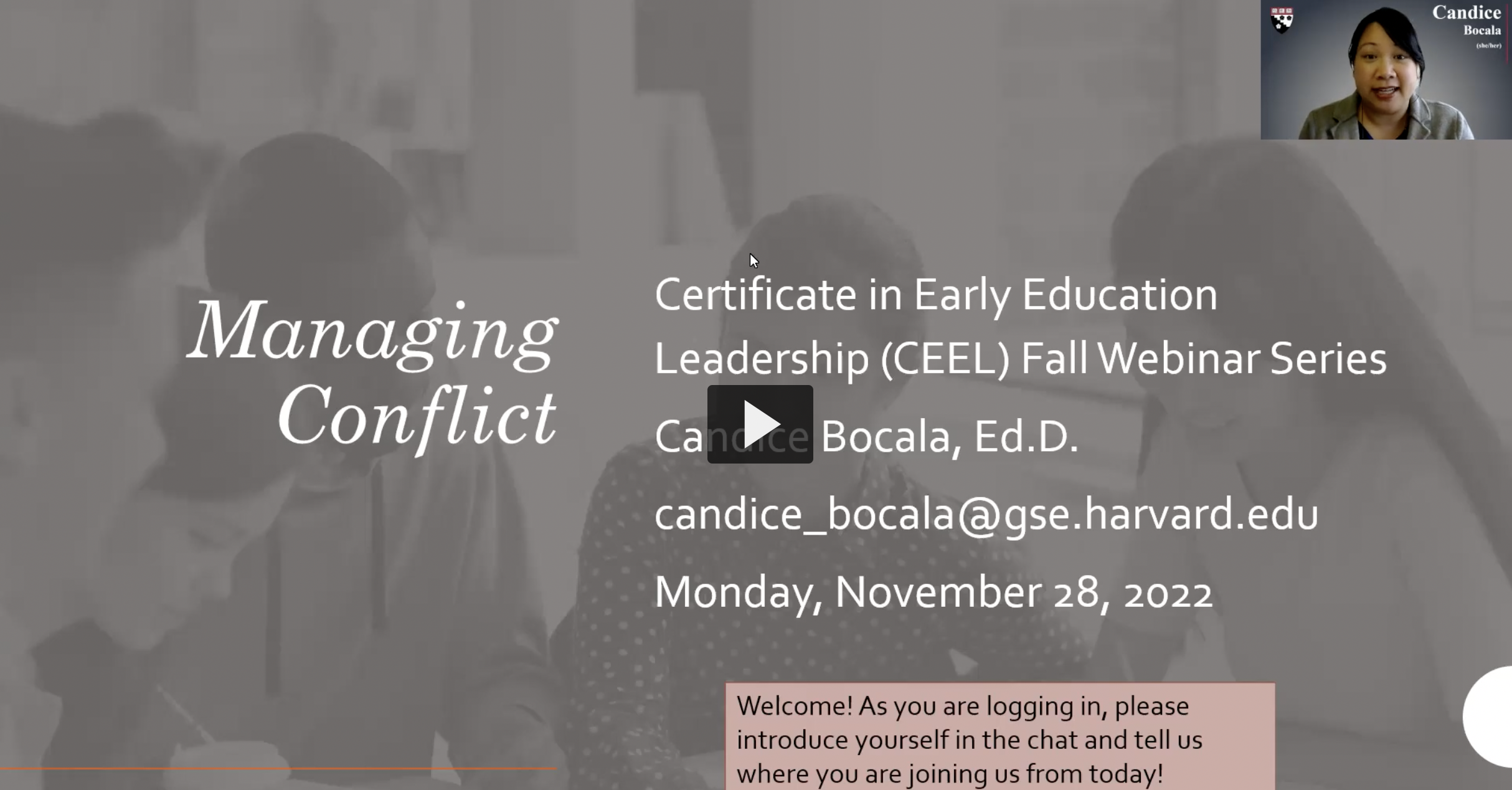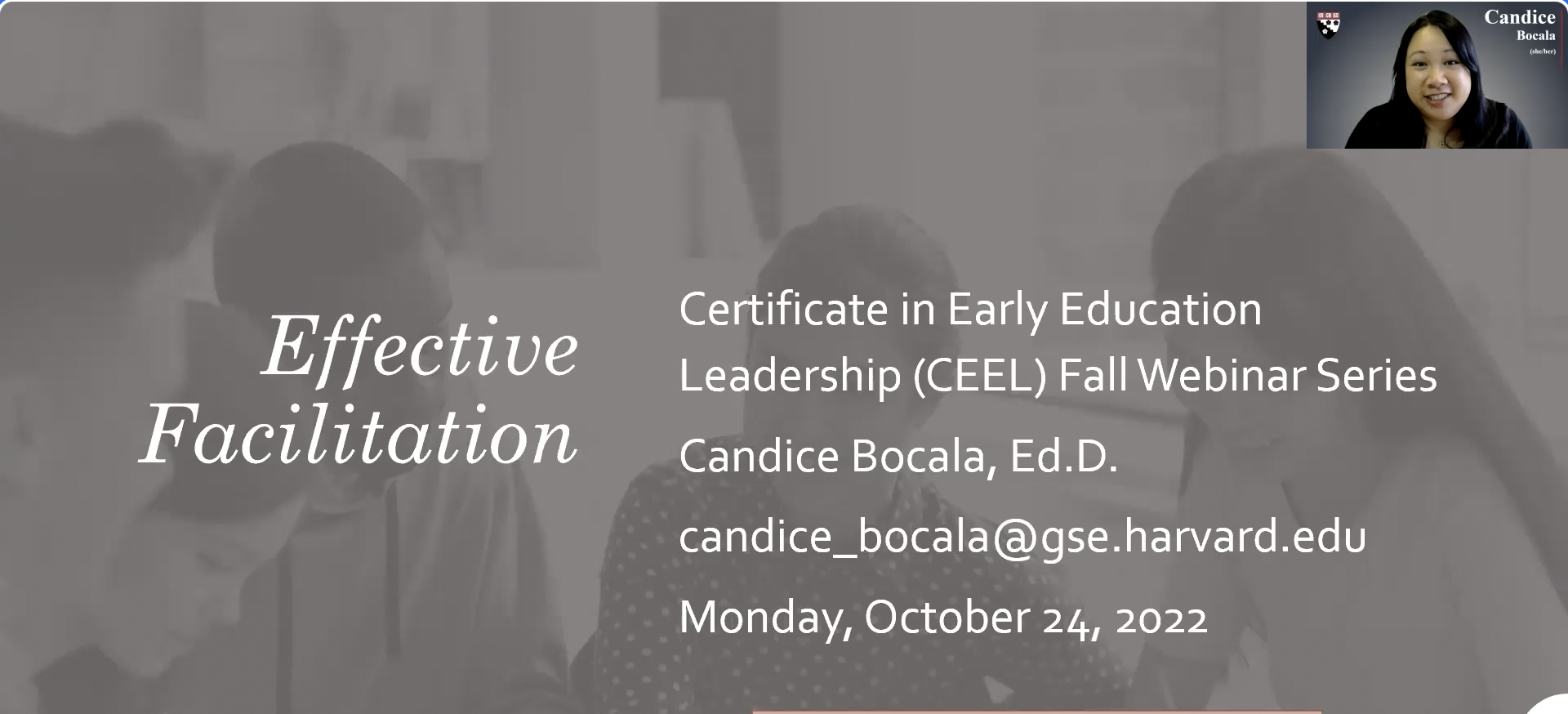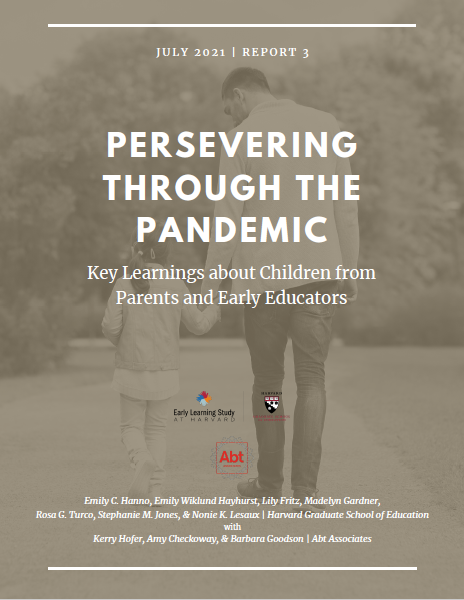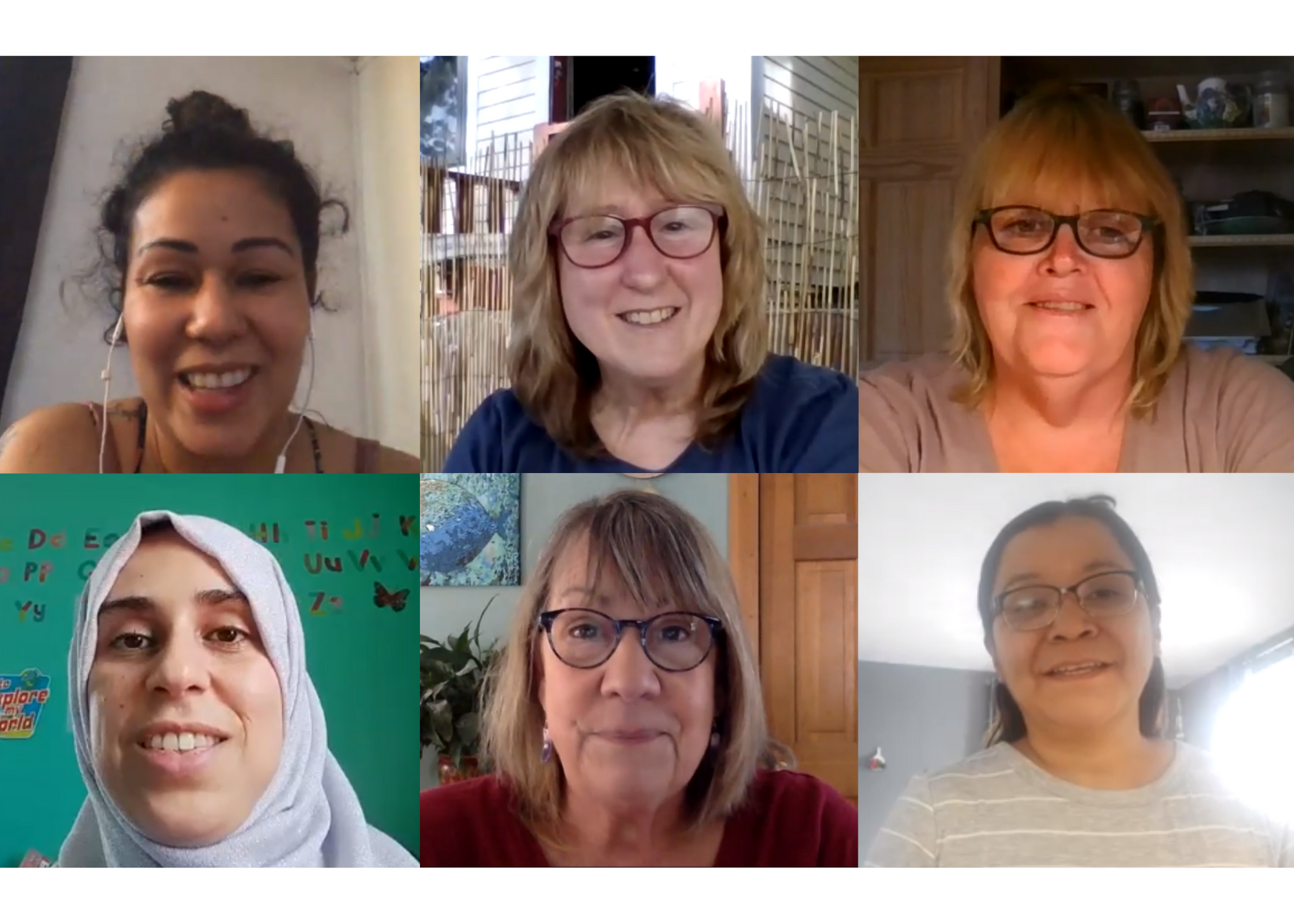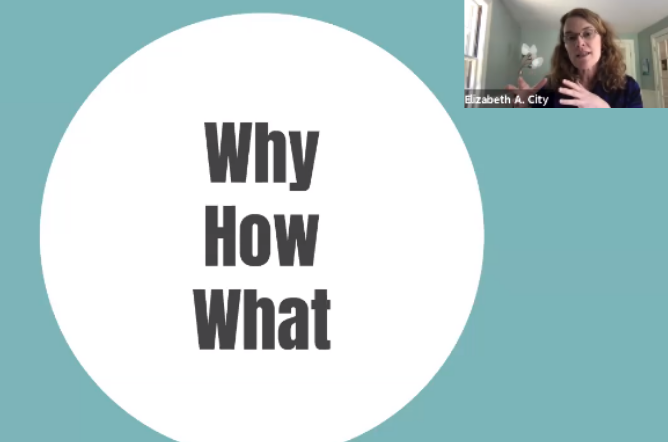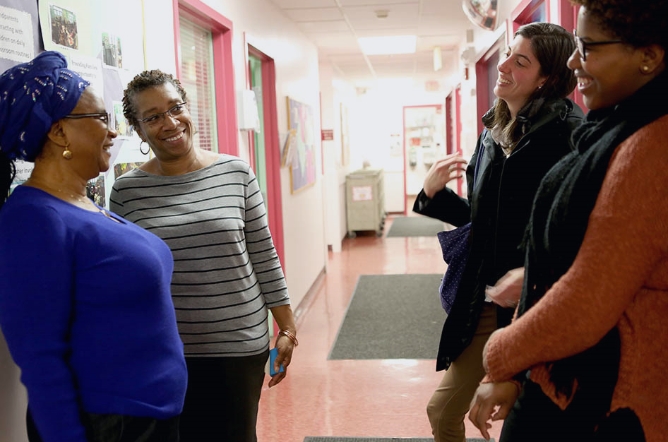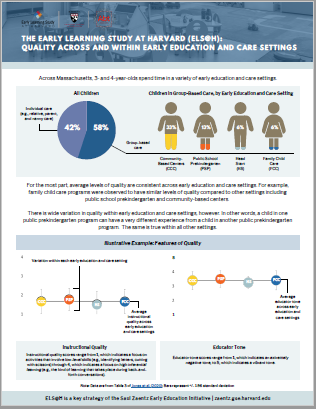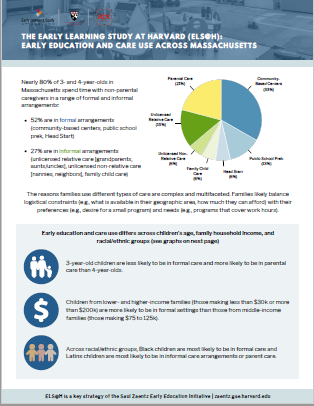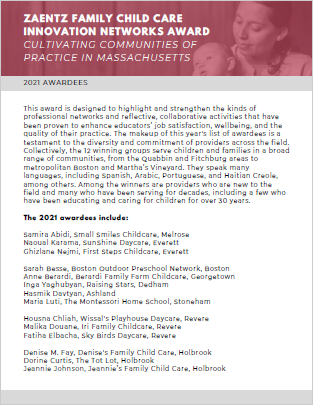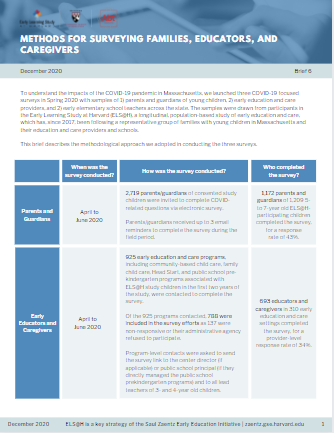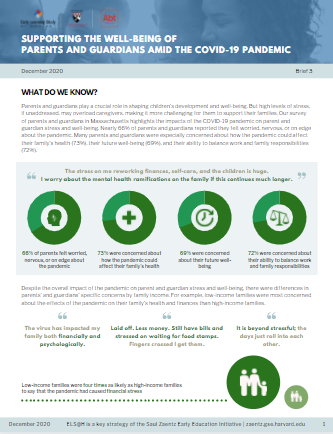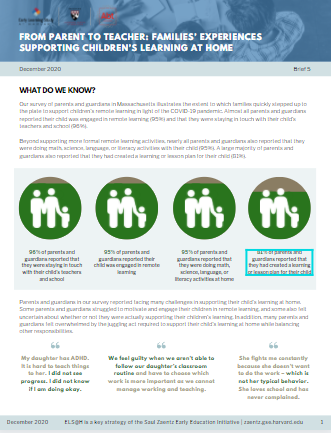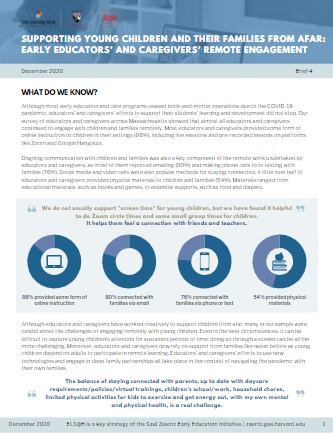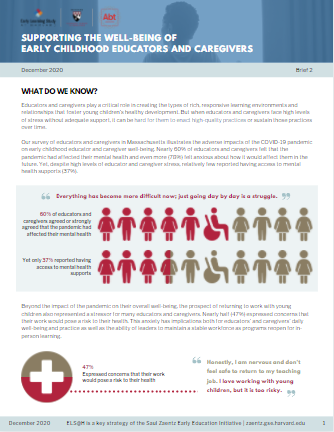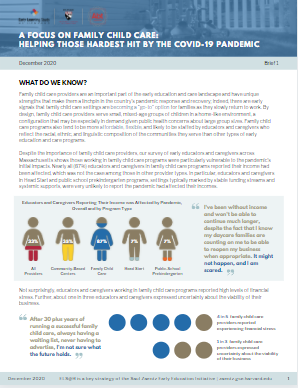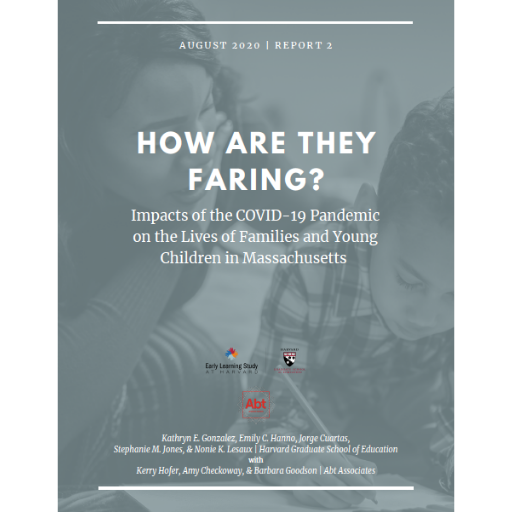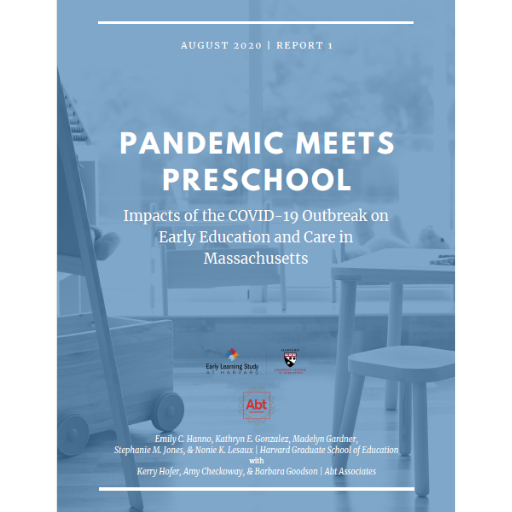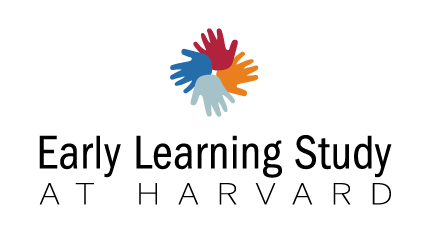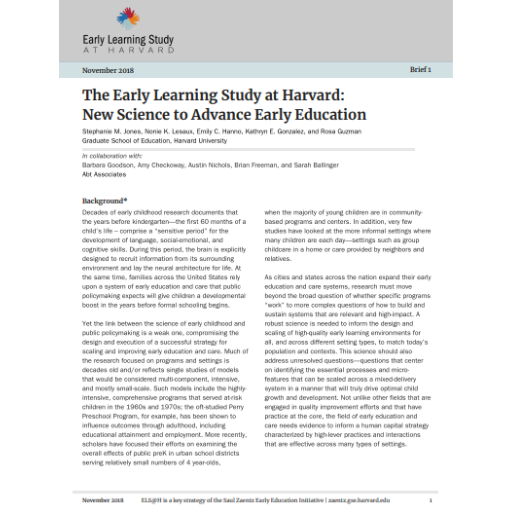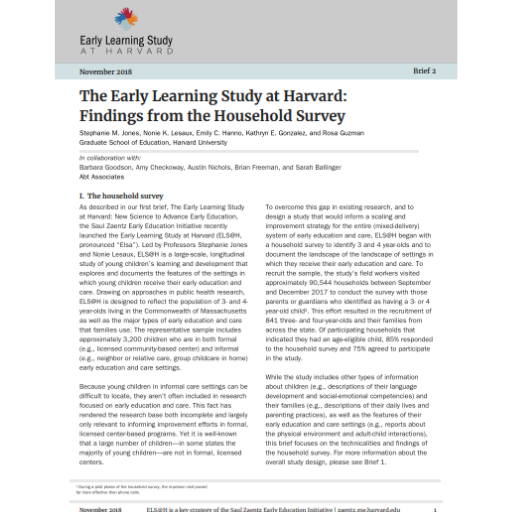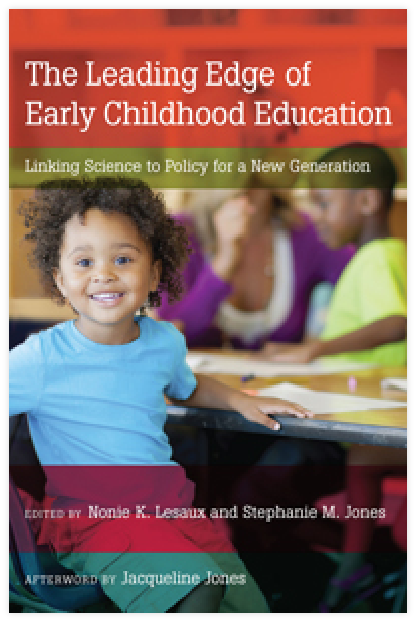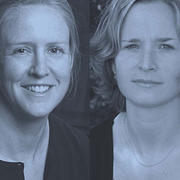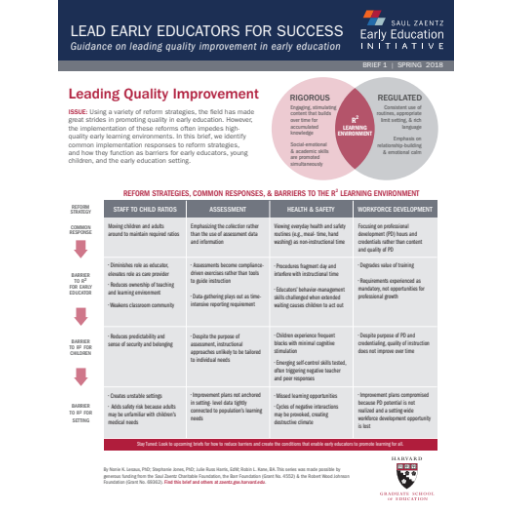Resource Hub
The Zaentz Initiative is dedicated to a rapid-cycle dissemination strategy that provides accessible, progressive, and practical resources.
Resources
Sort By:
Cambridge Early Childhood Pulse Survey: August 2023 Briefs
Briefs, ELS@H
The Cambridge Early Childhood Pulse Survey is a comprehensive, citywide project led by the Saul Zaentz Early Education Initiative at the Harvard Graduate School of Education (HGSE) in collaboration with the Cambridge Office of Early Childhood. Cambridge Early Childhood Pulse Survey, Brief 5: Early Educator Strengths and Challenges in Their Own Words
Briefs, ELS@H
The Pulse Survey included a series of open-ended questions where respondents could describe what they enjoy most and what they wish they could change about their role as an early educator. A consistent theme was that Cambridge's early educators wish others knew more about the vast, multifaceted, and challenging nature of their role. This final brief showcases early educators' own descriptions of the greatest strengths, joys, and challenges of their role. Cambridge Early Childhood Pulse Survey, Brief 4: Early Educator Preferences for Professional Development
Briefs, ELS@H
Early education professionals require and deserve access to professional development (PD) that help grow their preexisting skills and knowledge, as well as help them develop new ones. Early care and education programs spend a considerable portion of their funds on professional development; yet little is known about what types of PD early educators actually receive, and what their preferences for PD are with respect to content and format. Cambridge's early educators shared their perspectives on this topic through their responses to the Pulse Survey. Cambridge Early Childhood Pulse Survey, Brief 3: Early Educator Wellbeing
Briefs, ELS@H
While the pandemic created immense challenges for educators at all levels, rates of turnover in the field of early care and education are much higher than those in in the K-12 system. To address workforce retention, it is important to learn more about why early educators might be leaving the field, and what they need in order to stay. We asked a series of questions about the early education workforce's quality of life, and what they might need to improve their experiences in the City of Cambridge. Cambridge Early Childhood Pulse Survey, Brief 2: Programs and Providers
Briefs, ELS@H
In Spring 2022, all early educators working with children in group-based early education settings were invited to participate in the Cambridge Early Childhood Pulse Survey. This brief documents some of our preliminary findings about the early education workforce in Cambridge. Cambridge Early Childhood Pulse Survey, Brief 1: Introducing the Cambridge Early Childhood Pulse Survey
Briefs, ELS@H
The Cambridge Early Childhood Pulse Survey is a comprehensive, citywide project led by the Saul Zaentz Early Education Initiative at the Harvard Graduate School of Education (HGSE) in collaboration with the Cambridge Office of Early Childhood. This brief provides an introduction to the survey. Persevering Through the Pandemic: Key Learnings about Children from Parents and Early Educators
Briefs, ELS@H, Study
Leveraging data collected in late 2020 and early 2021 as part of the Early Learning Study at Harvard (ELS@H), this report captures the ongoing effects of the COVID-19 pandemic on children, families, and early educators in Massachusetts. This report contains five snapshots addressing two guiding questions: How are children doing? And what is helping children and families cope with the challenges they have faced over the past fifteen months? " target="_blank">FCC Innovation Networks Award - Voices from the Field
Family Child Care, Innovation
Meet some of the providers chosen to receive the 2021 FCC Innovation Networks Award.
Focusing on What Matters Most: Selecting and Addressing Priorities During Times of Challenge and Change
Webinars
Even in the calmest of times, figuring out what to prioritize and then staying focused is a significant challenge for educators and leaders—and we are not in the calmest of times! How can we figure out what is most important when the external context is in flux, people are exhausted, and the future is uncertain? In this session, guests Liz City and Brian Radley take up this question and more, offering tools and concrete ideas for a learning-rich year to come.
Social Emotional Learning (SEL) and Equity: Beginning with Adults
Webinars
Thelma Ramirez and Emily Meland discuss strategies for promoting adult-centered, strengths-based, and culturally sustaining social-emotional learning. Quality Within and Across Early Education and Care Settings in Massachusetts
Briefs, ELS@H
This brief describes findings from the Early Learning Study at Harvard (ELS@H). Early Education and Care Use Across Massachusetts
Briefs, ELS@H
This brief describes findings from the Early Learning Study at Harvard (ELS@H). 2021 Family Child Care Innovation Networks Award Winners
Family Child Care, Innovation
This document lists the winners of the 2021 Family Child Care Innovation Networks Award. Methods for Surveying Families, Educators, and Caregivers
Briefs, ELS@H
This brief describes the methodological approach we adopted in conducting the three ELS@H COVID surveys. Supporting the Well-Being of Parents and Guardians amid the COVID-19 Pandemic
Briefs, ELS@H
This brief is based on findings from a survey of 1,172 parents and guardians of five- to seven-year-old children across Massachusetts. For additional information, see the full report: How are they faring? Impacts of the COVID-19 pandemic on the lives of families and young children in Massachusetts. From Parent to Teacher: Families’ Experiences Supporting Children’s Learning at Home
Briefs, ELS@H
This brief is based on findings from a survey of 1,172 parents and guardians of five- to seven-year-old children across Massachusetts. For additional information, see the full report: How are they faring? Impacts of the COVID-19 pandemic on the lives of families and young children in Massachusetts. Supporting Young Children and Their Families from Afar: Early Educators’ and Caregivers’ Remote Engagement
Briefs, ELS@H
This brief is based on findings from a survey of 693 early educators and caregivers representing 310 early learning programs in Massachusetts. For additional information, see the full report: Pandemic Meets Preschool: Impacts of the COVID-19 Outbreak on Early Education and Care in Massachusetts. Supporting the Well-Being of Early Childhood Educators and Caregivers
Briefs, ELS@H
This brief is based on findings from a survey of 693 early educators and caregivers representing 310 early learning programs in Massachusetts. For additional information, see the full report: Pandemic Meets Preschool: Impacts of the COVID-19 Outbreak on Early Education and Care in Massachusetts. A Focus on Family Child Care: Helping those Hardest Hit by the COVID-19 Pandemic
Briefs, ELS@H
This brief is based on findings from a survey of 693 early educators and caregivers representing 310 early learning programs in Massachusetts. For additional information, see the full report: Pandemic Meets Preschool: Impacts of the COVID-19 Outbreak on Early Education and Care in Massachusetts. How are they Faring? Impacts of the COVID-19 Pandemic on the Lives of Families and Young Children in Massachusetts
Briefs, ELS@H
This report describes families’ experiences during the first few months of the Coronavirus disease
(COVID-19) pandemic in Massachusetts. Nearly 1,200 parents and guardians of 5-, 6-, and 7-yearolds
across the state provided insights into their pandemic-related concerns; life changes,
disruptions, and adjustments; family needs; and children’s lives at home. Pandemic Meets Preschool: Impacts of the COVID-19 Outbreak on Early Education and Care in Massachusetts
Briefs, ELS@H
This report describes the experiences of early educators and caregivers of 3- and 4-year-old
children in family child care, community-based center, Head Start, and public school
prekindergarten programs during the first few months of the Coronavirus disease (COVID-19)
pandemic in Massachusetts. Nearly 700 individuals working with young children and their families
across the state offered insights into program operations; use of public supports; remote
engagement with children and families; and personal wellbeing in the midst of the pandemic. Early Learning Study at Harvard: Household Survey Full Report
Briefs, ELS@H
Led by Professors Stephanie Jones and Nonie Lesaux, the Early Learning Study at Harvard (ELS@H), a cornerstone of the Zaentz Early Education Initiative, is a first-of-its-kind, statewide study designed to examine children's learning and development in the context of their early education and care experiences. ELS@H’s large-scale, longitudinal design and its population-based, representative sample enables the study to address key questions that face today’s policymakers and practitioners, focusing in particular on questions about scaling effective models and practices, and about the characteristics of settings and communities that are essential for children’s long-term health and well-being. The Early Learning Study at Harvard: New Science to Advance Early Education
Briefs, ELS@H
Decades of early childhood research documents that the years before kindergarten—the first 60 months of a child’s life – comprise a “sensitive period” for the development of language, social-emotional, and cognitive skills. During this period, the brain is explicitly designed to recruit information from its surrounding environment and lay the neural architecture for life. At the same time, families across the United States rely upon a system of early education and care that public policymaking expects will give children a developmental boost in the years before formal schooling begins. The Early Learning Study at Harvard: Findings from the Household Survey
Briefs, ELS@H
As described in our first brief, The Early Learning Study at Harvard: New Science to Advance Early Education, the Saul Zaentz Early Education Initiative recently launched the Early Learning Study at Harvard (ELS@H, pronounced “Elsa”). Led by Professors Stephanie Jones and Nonie Lesaux, ELS@H is a large-scale, longitudinal study of young children’s learning and development that explores and documents the features of the settings in which young children receive their early education and care. Harvard Edcast: The Power of Convening
Podcasts
Jacqueline Jones, president of the Foundation for Child Development, reflects on the dialogue and unique collaborations between researchers and practioners in the field of early childhood education. Harvard Edcast: Streamlining Early Learning
Podcasts
Bobbie Burnham, early childhood educator, shares successes and strategies from her time working in the Minnesota Dept. of Education. Harvard EdCast: The Importance of Years 0–5
Podcasts
Nonie Lesaux and Stephanie Jones, members of the faculty at HGSE, examine the latest thinking, research, and practice in building and sustaining high quality Pre-K systems, schools and classrooms. The Leading Edge of Early Childhood Education: Linking Science to Policy for a New Generation
Books
The Leading Edge of Early Childhood Education aims to support the effort to simultaneously scale up and improve the quality of early childhood education by bringing together relevant insights from emerging research to provide guidance for this critical, fledgling field. It reflects the growing recognition that early childhood experiences have a powerful effect on children’s later academic achievement and long-term life outcomes. The Regulated Learning Environment: Supporting Adults to Support Children
Articles
The Zaentz team outlines four principles central to cultivating regulated early learning environments (Young Children, 2015). Empowering Early Childhood Educators
Articles
Nicholas Kristof, the New York Times columnist, challenges his readers (and the politicians eager to represent them) to ask themselves if we can afford to continue to let learning opportunities slide for our youngest and most vulnerable children. Kristof is not the only one ready to dispense with the hand-wringing about whether early education “works” and move immediately on the promise of early learning to transform children’s life chances. From the dramatic expansion of preK in New York City to the White House’s Preschool for All initiative, federal, state, and community agencies across the nation are engaged with an aspirational and ambitious agenda for dramatic expansion of children’s learning opportunities in the years before kindergarten. The Early Education Leader's Guide
Books
Grounded in current research and theory, this practical guide gives program leaders and staff developers a roadmap for designing and implementing engaging professional development and coaching approaches. It focuses on early educator competencies essential for high quality learning and teaching—executive functions, emotion regulation, relationship skills, and talk for learning. Illustrated with an extended vignette of an early learning center, the book highlights how addressing educators’ professional needs is a pathway to children’s cognitive, social–emotional, and academic growth. Briefs for Early Education Leaders
Briefs
Lead Early Educators for Success provides the principles behind, and the strategies for, supporting early educators in ways that cultivate rigorous and regulated learning environments. Each brief revisits assumptions that guide current policies and practices, outlines common pitfalls, and provides actionable suggestions relevant to each topic (e.g., program design, human and financial resource strategies, support for implementation). Ingredients of Early Success
Articles
A new study from Harvard University could substantially transform our understanding of what works in early childhood education in the United States, creating clearer avenues to bring effective practices and policies to scale. 